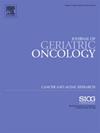Healthcare professionals' perspectives on improving care coordination between palliative and cancer care for rural older adults: A qualitative study
IF 3
3区 医学
Q3 GERIATRICS & GERONTOLOGY
引用次数: 0
Abstract
Introduction
Rural-dwelling older adults with cancer have limited access to palliative care and face barriers in coordinating palliative care with cancer care. This study aimed to identify barriers and facilitators to care coordination in the palliative care referral and care delivery process for rural-dwelling older adults with cancer from the perspectives of palliative care and oncology healthcare professionals (HCPs).
Materials and Methods
We conducted focus groups and dyadic semi-structured interviews with palliative care and oncology HCPs. Participants were recruited from clinics within large academic health systems (n = 14) and rural non-affiliated practices (n = 11) in Colorado. We analyzed interviews guided by a reflexive thematic analysis approach.
Results
Five themes emerged; within each theme specific barriers and facilitators were identified: (1) Tension of different practice styles delays palliative care referral for rural older adults; (2) Limited capacity prevents early palliative care integration for older adults in rural areas; (3) Structured communication pathways can facilitate coordinated care for older rural adults; (4) Competing influences of rural cultural context on older adults' palliative and oncologic care coordination; and (5) Telehealth has “come a long way,” offering more opportunities for rural older adults to receive effective care coordination. Participants also shared insights on intervention strategies targeting barriers to coordinating palliative care with cancer care for rural-dwelling older adults with cancer.
Discussion
The identified barriers and facilitators suggest intervention targets to improve care coordination between palliative care and cancer care for rural-dwelling older adults at the health system, provider, and patient levels.
医疗保健专业人员对改善农村老年人姑息治疗和癌症治疗之间护理协调的看法:一项定性研究
农村居住的老年癌症患者获得姑息治疗的机会有限,并且在协调姑息治疗与癌症治疗方面面临障碍。本研究旨在从姑息治疗和肿瘤医疗保健专业人员(HCPs)的角度,确定农村居住的老年癌症患者在姑息治疗转诊和护理提供过程中的护理协调障碍和促进因素。材料和方法我们对姑息治疗和肿瘤学HCPs进行了焦点小组和二元半结构化访谈。参与者从科罗拉多州大型学术卫生系统(n = 14)和农村非附属诊所(n = 11)的诊所招募。我们通过反身性主题分析方法对访谈进行分析。结果出现了五大主题;在每个主题中确定了具体的障碍和促进因素:(1)不同实践风格的张力延迟了农村老年人的姑息治疗转诊;(2)能力有限阻碍了农村地区老年人早期姑息治疗的整合;(3)结构化的沟通路径可以促进农村老年人的协调护理;(4)农村文化背景对老年人姑息治疗和肿瘤治疗协调的竞争影响;(5)远程医疗“取得了长足的进步”,为农村老年人提供了更多获得有效护理协调的机会。与会者还分享了针对农村老年癌症患者姑息治疗与癌症治疗协调障碍的干预策略的见解。已确定的障碍和促进因素提出了干预目标,以改善卫生系统、提供者和患者层面上农村老年人姑息治疗和癌症治疗之间的护理协调。
本文章由计算机程序翻译,如有差异,请以英文原文为准。
求助全文
约1分钟内获得全文
求助全文
来源期刊

Journal of geriatric oncology
ONCOLOGY-GERIATRICS & GERONTOLOGY
CiteScore
5.30
自引率
10.00%
发文量
379
审稿时长
80 days
期刊介绍:
The Journal of Geriatric Oncology is an international, multidisciplinary journal which is focused on advancing research in the treatment and survivorship issues of older adults with cancer, as well as literature relevant to education and policy development in geriatric oncology.
The journal welcomes the submission of manuscripts in the following categories:
• Original research articles
• Review articles
• Clinical trials
• Education and training articles
• Short communications
• Perspectives
• Meeting reports
• Letters to the Editor.
 求助内容:
求助内容: 应助结果提醒方式:
应助结果提醒方式:


